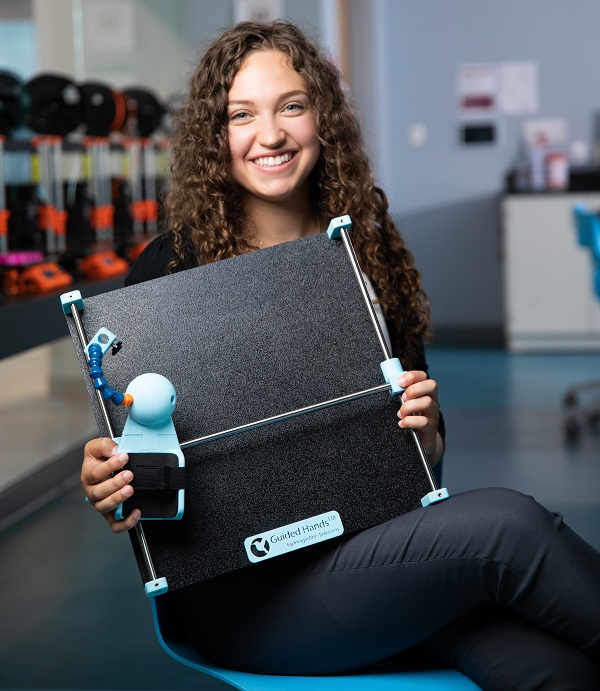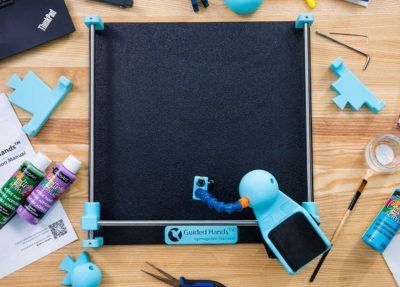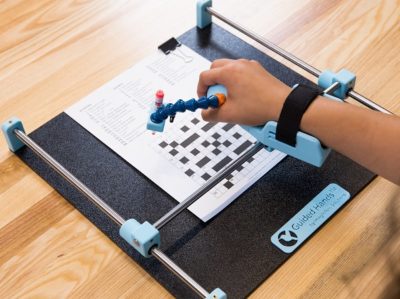
In North America, there are over 58 million people of all ages experiencing limited hand mobility, hand and arm weakness and difficulty grasping and controlling objects, because of a medical condition or injury. This includes people living with Cerebral Palsy, Multiple Sclerosis, Muscular Dystrophy and those recovering from spinal cord injuries and strokes. Performing daily activities like writing, drawing, painting, and accessing technology becomes very difficult or even impossible. As a result of the physical limitation, these individuals experience a loss of independence, self-expression, social exclusion and frustration.
McMaster University biomedical and mechanical engineering student Lianna Genovese was inspired to help solve this human problem, directing her energy to create a solution that supports people with limited hand mobility in their hobbies and passions.
 At 18 years old, Lianna channelled her natural entrepreneurial spirit and engineering knowledge to develop Guided Hands™, a mechanical assistive device that enables anyone living with limited hand mobility to write, paint, draw and use a touch-screen device. This innovation has been awarded the national James Dyson Award, a design award that celebrates and inspires the next generation of engineers.
At 18 years old, Lianna channelled her natural entrepreneurial spirit and engineering knowledge to develop Guided Hands™, a mechanical assistive device that enables anyone living with limited hand mobility to write, paint, draw and use a touch-screen device. This innovation has been awarded the national James Dyson Award, a design award that celebrates and inspires the next generation of engineers.
“I met a woman named Elissa who lives with Cerebral Palsy, and after hearing her story about losing her ability to paint – a talent and passion she had lost due to the progression of her condition – I knew I had to find a solution,” says Lianna. “I wanted to help give her back her passion and contribute to a better quality of life.”
Inspired by the mechanics of a 3D printer, Guided Hands™ uses a simple sliding system composed of linear shafts and ball bearings. The unique system promotes controlled and guided hand movements in all directions, as the user holds a handpiece custom to the size of their hand and level of hand impairment. The handpiece is connected to an arm attachment that holds various writing utensils, such as a paintbrush, pen, marker or stylus and is designed to use the patient’s gross motor skills in their shoulder to perform activities rather than relying on fine motor skills in the hand which are often compromised.
 Over the past two years, Lianna has connected with over 150 patients of varying medical conditions, neurologists, and occupational therapists across Canada to help inform her design and perfect the device.
Over the past two years, Lianna has connected with over 150 patients of varying medical conditions, neurologists, and occupational therapists across Canada to help inform her design and perfect the device.
Lianna says, “It was important to me to test Guided Hands™ in real world scenarios and get in-person feedback. After meeting with a little girl named Bella, a child with Cerebral Palsy, and witnessing the smile on her face as she wrote, coloured, drew and played games on an iPad, I knew I had found my passion. I realized that what started off as a school project could become a real-world solution that could help change the lives of many people.”
Existing devices to assist with fine motor skills do not support controlled and guided hand movements, focusing instead on only allowing the user to hold a writing utensil or reduce tremors. The Guided Hands™ design is the only product that offers multiple ambidextrous handpieces and uses a unique sliding system to glide the hand seamlessly during an activity.
Today, at 21 years old, Lianna is the CEO & Founder of her own company called ImaginAble Solutions and has launched healthcare pilots for Guided Hands™ across North America to further test with patients and health professionals. Her company introduced Guided Hands into the market at the end of August 2021 making the device available to people across Canada and the USA. Additionally, as the Canadian National James Dyson Award winner, Lianna has received $3,500 to go towards her innovation and will progress to the international competition with a grand prize of $50,000.
The James Dyson Award International Winner will be announced on November 17, 2021. To follow Lianna’s journey to the international stage of the competition and to learn more about the foundation’s continued work to inspire and support young engineers visit the Foundation website.
This article was submitted by the James Dyson Foundation.

